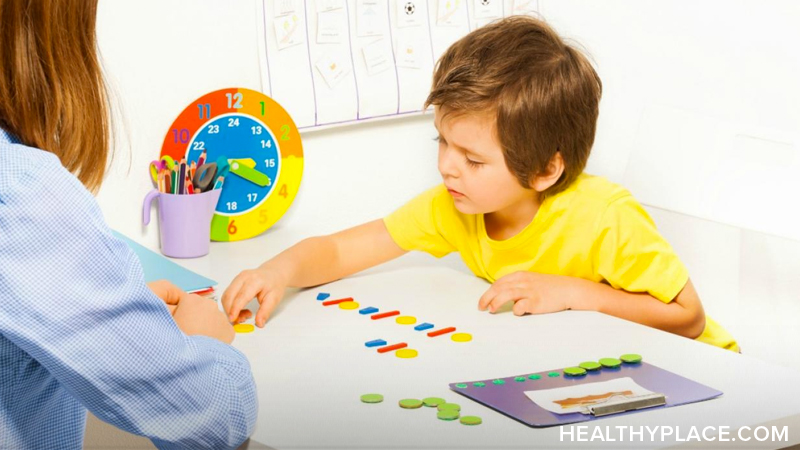The Impact of ADHD on Siblings

Analysis of a study on the tremendous negative impact that children with ADHD can have on their siblings.
What is it like for a child when one of his or her siblings has ADHD? What are the kinds of issues that children in this situation tend to struggle with? This is an extremely important area for parents and professionals to attend to and almost no research on this topic exists.
That is why I was so pleased to recently locate a study in which this issue is examined (Kendall, J., Sibling accounts of ADHD. Family Process, 38, Spring, 1999, 117-136). I found this to be a wonderful study, even though the information presented is somewhat upsetting. As you read the information below, please keep in mind that what the author of this study reported does not necessarily apply to all children who have a sibling with ADHD. I have personally seen families where the relationship between sibs when one had ADHD was quite positive, and this may certainly be true of your own family. Nonetheless, I believe what was uncovered in this study is potentially quite instructive and useful to know about.
Because so little work has been done in this area, the author elected to conduct a qualitative rather than a quantitative investigation. Rather than collecting rating scale data, or other kinds of data that could be translated into numbers and then analyzed statistically, the approach was to gather as much in-depth information as possible about the experience of children who live with a sibling who has ADHD.
This was done by conducting a series of in-depth interviews with children and parents in 11 families. These families were participants in a larger study on the family experience of living with a child with ADHD. Thirteen non-ADHD siblings, 11 biological mothers, 5 biological fathers, 2 stepfathers, and 12 boys with ADHD each participated in 2 individual interviews and 2 family interviews. Eight of the 13 non-ADHD siblings were younger than their ADHD brother and 5 were older. Seven were boys and 6 were girls. The average age of the boys with ADHD in these families was 10. None of the children with ADHD were girls. Five of the boys diagnosed with ADHD had also been diagnosed with Oppositional Defiant Disorder. Three of the families were of low income and receiving federal assistance. The other 8 families were of either middle or upper-middle socioeconomic status.
In addition to collecting data by interview, written diaries were also kept by the non-ADHD siblings. These children were asked to write in there diaries once a week for 8 weeks regarding their account of a critical incident - either particularly good or particularly bad - that related to ADHD. These diaries, along with the interviews that were were audiotaped and transcribed, formed the data base that was used to examine common themes in the lives of siblings. The goal was to identify the major themes that emerged across the accounts of the 13 different siblings who participated.
The author emphasizes that the findings to emerge represent only one possible account of the sibling experience, and should be considered as tentative. Because these accounts were provided spontaneously by siblings themselves, however, it is reasonable to believe that they capture important aspects of the experience for many children.
From the massive amount of data collected - over 3000 pages were transcribed - 3 major categories of the sibling experience were identified. These categories were disruption, effects of disruption, and strategies for managing disruption. An overview of the experiences represented by these different categories is presented below. An extremely rich set of descriptive data was presented, and I will do my best to capture this for you.
DISRUPTION
Disruption caused by the symptoms and behavior of their brother with ADHD was the most central and significant problem identified by the siblings. Children described their family life as chaotic, conflictual, and exhausting. Living with a sibling with ADHD meant never knowing what to expect next, and children did not expect this to end.
Seven types of disruptive behavior were identified. These included: physical and verbal aggression, out-of-control hyperactivity, emotional and social immaturity, academic underachievement and learning problems, family conflicts, poor peer relationships, and difficult relationships with extended family. These are the different problem areas that the siblings of ADHD brothers indicated as being most disruptive to their lives and to their family.
Although these types of disruption were reported consistently across the 13 siblings, there were, of course, important differences in the extent to which children reported themselves to be adversely affected. Children who were most affected lived in families where the sibling with ADHD was an adolescent, with more than one sibling or a parent who had ADHD, and where the sibling with ADHD was more aggressive which went along with having ODD in addition to ADHD. Among all siblings, however, it was clear that that the vast majority of family disruptions were attributed to their brother with ADHD.
There were several different types of disruptive patterns that were identified. These included the child with ADHD doing something that needed immediate attention, younger siblings mimicking disruptive behavior, seeking revenge on the sib with ADHD, or parents allowing the child with ADHD to "run wild". Children described family life as focusing on their sibling with ADHD and of constantly having to adjust to the disruption and the negative effects it had on themselves and family life.
EFFECTS OF DISRUPTION ON SIBLINGS
The disruptive effects of their ADHD siblings were experienced by children in 3 primary ways: victimization, caretaking, and feelings of sorrow and loss. These are described below.
VICTIMIZATION
Siblings reported feeling victimized by aggressive acts from their brothers with ADHD through overt acts of violence, verbal aggression, and manipulation/control. Although the most severe acts of aggression were reported by boys whose ADHD sibling also met diagnostic criteria for Oppositional Defiant Disorder, every sibling interviewed reported feeling victimized to some degree by their ADHD brother.
Although not all acts of aggression reported would be considered severe, all were perceived by siblings to be destructive to their sense of safety and well-being. They also reported that parents often minimized and did not believe the seriousness of the aggression. Thus, while parents tended to attribute such behavior to normal sibling rivalry, none of the children interviewed experienced their brother's aggression in this way.
Many children reported that they were easy targets for their brother's aggression because their parents were either too exhausted or too overwhelmed to intervene. Interestingly, this impression was confirmed by many of the ADHD children themselves, who noted that they could get away with hitting their sibling while they would get in trouble for such behavior at school.
Overall, siblings of boys with ADHD tended to report feeling unprotected by parents and were resentful of the degree to which family life was controlled by their brother. They often worried about the ADHD child "ruining" potentially fun activities that were planned and no longer looked forward to certain events because so much depended on how their brother with ADHD would behave.
Feelings of powerlessness was a commonly expressed sentiment. As children became increasingly resigned to their situation, many seemed to develop an image of themselves as unworthy of attention, love, and care, and experienced feelings of rejection from their parents.
CARETAKING
Many siblings reported that they were expected to act as their brother's caretaker. Both younger and older siblings talked about how parents expected them to befriend, play with, and supervise the ADHD child. Among the caretaking activities that children reported being expected to perform were: giving medication, helping with homework, intervening with other children and teachers on behalf of their brother, keeping their brother out of trouble, and getting their brother involved in activities when parents were exhausted.
Although 2 of the 11 siblings reported positive feelings and pride about taking on such a role, the others said this was quite difficult because they were expected to care for their brother even though they were frequent targets of his aggression. They also reported feeling that although they were supposed to provide relief for parents, they never received any relief themselves.
Children expressed resentment that they often felt responsible for their brother's care even though they had no input into the decision-making. Many felt caught in the middle - having to care for and supervise their brother while being attacked and victimized by him.
It is important to note that parents tended to regard such caregiving as what siblings do for one another, and did not regard it as anything particularly difficult or extraordinary. The children themselves, however, felt very differently about this.
FEELINGS OF SORROW AND LOSS
Many siblings of boys with ADHD reported feeling anxious, worried, and sad. They yearned for peace and quiet and mourned not being able to have a "normal" family life. They also worried about their sibling with ADHD - about his getting hurt by other people and getting into trouble.
Children reported feeling that parents expected them to be invisible - to not require too much of their attention and help since they were consumed caring for their child with ADHD. Many felt ignored and overlooked much of the time. They reported trying not to burden their parents any more then they were already burdened. They felt their needs were minimized by parents because they seem so much less significant than the needs of the ADHD child.
Some of these sentiments, of course, could be considered to be part of the competition for parental attention that is part of many sibling relationships. The author suggests, however, that these feelings are much more pronounced in siblings of a child with ADHD. It would have been quite instructive to collect similar data from children with non-ADHD siblings to see how such feelings compare.
STRATEGIES TO MANAGE DISRUPTION
Three of the 10 siblings reported that they dealt with their brother's behavior by fighting back. All 3 of these children had been diagnosed with Oppositional Defiant Disorder. Whether their aggressive behavior arose purely in response to the attacks of their ADHD sibling, or reflected other important causes as well, could not be determined.
The majority of siblings, however, responded to the situation with their ADHD brothers by learning to avoid and accommodate themselves to their brother. The process they described was a transformation of intense anger about how they were being treated, to sadness and resignation. In some children, this process appeared to result in clinical depression.
Some of the statements that children made about dealing with their sibling are really quite telling.
"I've learned to check and see how he's feeling before I even say hi when I come home from school. If he looks upset I don't say anything because I know he will yell at me. I dread coming home sometimes."
"I've learned not to talk to him about what's important to me because he won't listen or he'll say its stupid. So, I only talk to him about what he wants to talk about and that way he won't get mad at me."
"I just try to stay out of his way most of the time and go with the flow." Overall, 10 of the 13 siblings interviewed in the study thought they were severely and negatively affected by their brother with ADHD.
IMPLICATIONS
It is important to put the results of this study into the proper perspective. As the author points out, these findings are based on a small sample of ADHD children and their siblings, and the experiences of the siblings in this study may not necessarily be representative of what many children experience. Certainly, one would expect that some children with ADHD siblings have very positive relations with their sib and within their family. One can and should not assume, therefore, that children in one's own family are necessarily having a similar set of experiences.
As noted previously, it would be helpful to consider these children's reports in comparison to what children who live with non-ADHD siblings describe. This would help differentiate what may be more typical feelings that children with siblings have from what may be unique to children who have a sibling with ADHD.
The children in this study all had brothers with ADHD. One can certainly not assume that the experience of children with a sister who has ADHD would be similar. This would be a very interesting and important issue to examine in future research.
It is also possible that children's reports of their experience may not necessarily reflect the actual reality of their situation. They may feel frequently victimized by their ADHD brother and overlooked by their parents when this is not truly the case. Certainly, it is not uncommon for children to feel they are being treated unfairly by sibs and parents, and this could certainly have contributed to what these children had to say about their situation.
These caveat aside, these data have important implications and I think need to be taken quite seriously. The description provided by the children in this study is certainly consistent with what I have observed in many of the families I have worked with.
There are several things that parents can do to minimize the likelihood of their child without ADHD having the type of experience described here. An important place to start would be to think carefully about how the experiences shared by the siblings in this study fit with what may be going on for your own children. It is difficult for any parent to recognize that one of their children is being victimized - even when it is by their other child. The parents in this study, as you recall, tended to minimize the reports of siblings and to attribute what was going on to normal sibling rivalry. The children themselves, however, had a very different perspective.
The same applies to taking a careful look at how much one is expecting a child to care for his/her sibling. These children tended to feel burdened by caretaking responsibilities when parents believed it was what siblings do for each other. Asking oneself what your own family's expectations are and whether or not they are reasonable could be quite useful. I have to say reading this provided an important wake up call to me.
Sibling reports of aggression/violence need to be taken seriously. There can be an almost reflexive reaction to deny or minimize such accounts, which can leave a child feeling very much alone and unprotected.
As difficult as it can be in busy families, making the effort to spend special time alone with the non-affected sibling can be enormously helpful. These children were reluctant to make demands of their parents because they saw them as so overburdened trying to manage their sibling. They, of course, need parental attention as well, and making sure that it is provided can go a long way to helping a child feel better about his or her situation in the family.
For health care professionals, I think these results highlight the importance of paying close attention to the siblings of a child with ADHD in an overall evaluation and treatment plan. A focus on how to maintain a reasonable family life in spite of the disruption caused by behaviors related to ADHD may be important for many families. Looking back on my own practice, I now recognize how often I failed to consider the needs and experiences of siblings as fully as may be necessary.
The impact on family members of children with ADHD, particularly on siblings, is an important but under-researched area. This qualitative study is an important initial step to learn more about this. I am concerned that the findings of this study may be disconcerting to some readers and sincerely hope that if this is the case, you are able to take positive steps to address issues that you feel are important.
About the author: David Rabiner, Ph.D. is a clinical psychologist, Senior Research Scientist at Duke University and expert on ADHD in children.
APA Reference
Staff, H.
(2022, January 17). The Impact of ADHD on Siblings, HealthyPlace. Retrieved
on 2025, November 11 from https://www.healthyplace.com/parenting/adhd/the-impact-of-adhd-on-siblings








